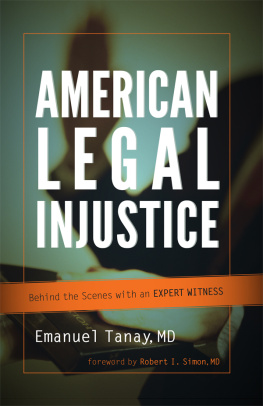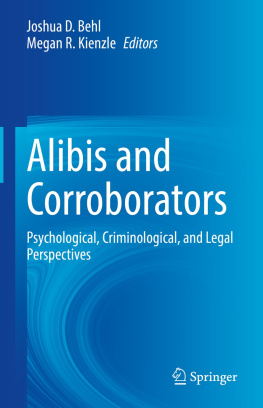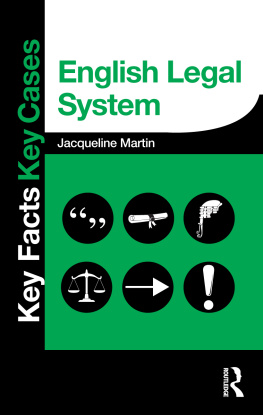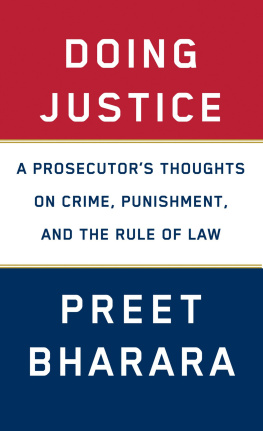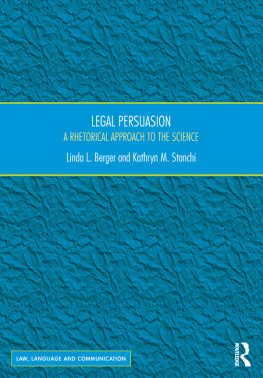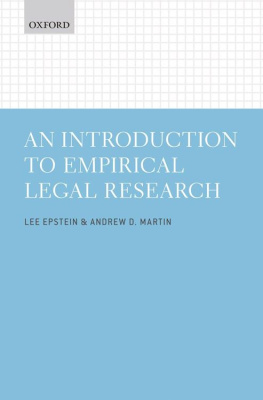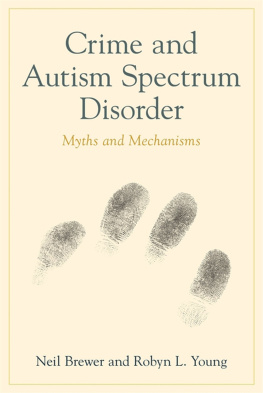Contents
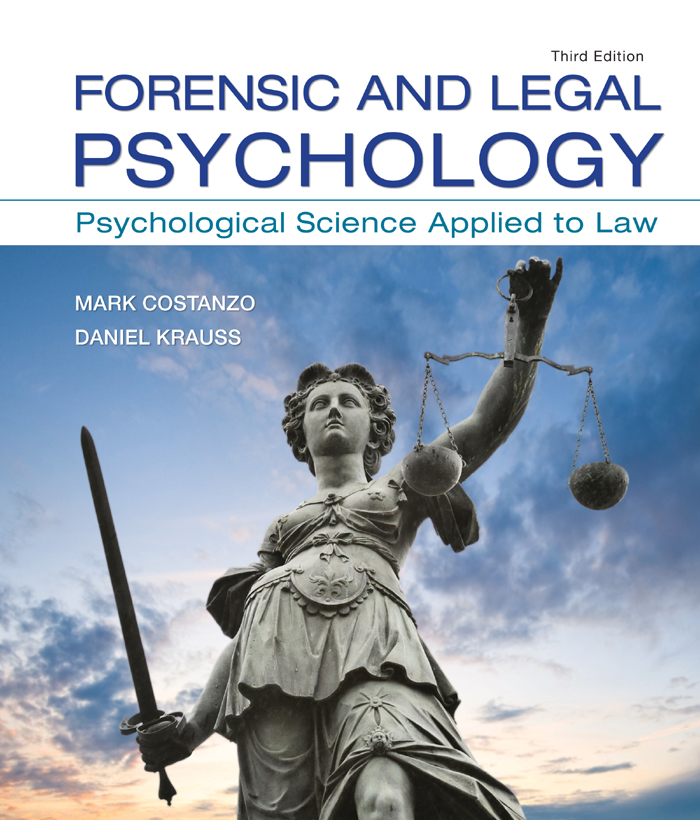
Forensic and Legal Psychology
Psychological Science Applied to Law
Third Edition
Mark Costanzo
Claremont McKenna College
Daniel Krauss
Claremont McKenna College

Vice President, Social Sciences and High School: Charles Linsmeier
Director of Content and Assessment, Social Sciences: Shani Fisher
Senior Associate Editor: Sarah Berger
Developmental Editor: Len Neufeld
Assistant Editor: Melissa Rostek
Senior Marketing Manager: Lindsay Johnson
Marketing Assistant: Morgan Ratner
Director of Media Editorial, Social Sciences: Noel Hohnstine
Assistant Media Editor: Nik Toner
Director, Content Management Enhancement: Tracey Kuehn
Managing Editor: Lisa Kinne
Project Managers: Edward Dionne and Ronald Dsouza, MPS Limited
Media Project Manager: Joseph Tomasso
Senior Workflow Supervisor: Susan Wein
Senior Photo Editor: Robin Fadool
Photo Researcher: Krystyna Borgen
Director of Design, Content Management: Diana Blume
Senior Design Manager: Vicki Tomaselli
Art Manager: Matthew McAdams
Composition: MPS Limited
Interior Designer: Kevin Kall
Cover Designer: Vicki Tomaselli
Printing and Binding: LSC Communications
Cover Photos: Front: Justice statue Credit: ER_09/Shutterstock. Back: Justice, Martin Luther King Jr. Federal Courthouse, Newark, NJ, 1994. Credit: Diana Moore, Justice 1994 Martin Luther King Jr. United States Federal Courthouse, Newark, NJ. Commissioned through the Art and Architecture Program, Fine Arts Collection, U.S. General Services Administration. Photo credit: Blake Logan.
Library of Congress Control Number: 2017946393
ISBN-13: 978-1-319-06031-2
ISBN-10: 1-319-06031-5
Copyright 2018, 2015, 2012 Worth Publishers
All rights reserved
Printed in the United States of America
First printing
Worth Publishers
One New York Plaza
Suite 4500
New York, NY 10004-1562
www.macmillanlearning.com
For Frances Costanzo, the kindest, most
perceptive person Ive ever known.
M.C.
To Herbert H. Krauss (19402016), who taught me
how to be a psychologist and a father.
D.K.
ABOUT THE AUTHORS
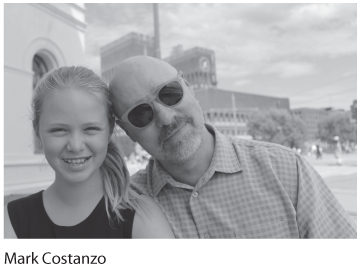
Mark Costanzo received his PhD in applied social psychology from the University of California at Santa Cruz. He is a professor of psychology at Claremont McKenna College and a member of the plenary faculty at Claremont Graduate University. He has published research on a variety of law-related topics, including police interrogations, false confessions, jury decision making, sexual harassment, attorney argumentation, alternative dispute resolution, and the death penalty. Professor Costanzo is author of the books Just Revenge: Costs and Consequences of the Death Penalty and Psychology Applied to Law. He has coedited four books, including Expert Psychological Testimony for the Courts and Violence and the Law.
Professor Costanzo has served as a consultant for more than 150 criminal cases and has provided expert testimony in state, federal, military, and juvenile courts. He has received outstanding teaching and mentoring awards from the American Psychology-Law Society, the Society for the Psychological Study of Social Issues, the Western Psychological Association, and the Society for the Teaching of Psychology.
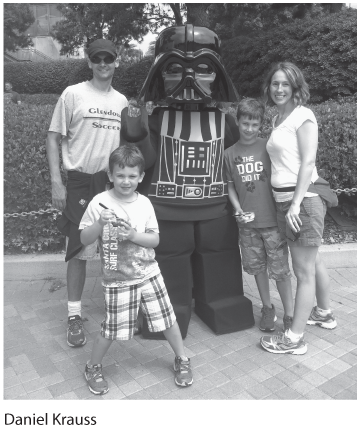
Daniel Krauss completed a joint-degree program in psychology and law at the University of Arizona, receiving his JD and then his PhD in clinical psychology and psychology, policy, and law. He is a professor at Claremont McKenna College and is a member of the plenary faculty at Claremont Graduate University. Professor Krauss has published a large number of research articles and book chapters relating to clinical psychological evaluations for the courts, legal and psychological expertise, and jury decision making. He is coeditor of The Law and Public Policy: Psychology and the Social Sciences book series published by the American Psychological Association Press and coauthor (with Bruce Sales) of The Psychology of Law: Human Behavior, Legal Institutions, and Law in that series.
Professor Krauss is licensed to practice law in Arizona, is a member of the United States Supreme Court bar, and has served as the United States Supreme Court Fellow to the U.S. Sentencing Commission. He is a licensed clinical psychologist in the state of California; a diplomate in forensic psychology, board certified by the American Board of Professional Psychology; and a member of the board of directors of the American Board of Forensic Psychology. Professor Krauss was a recipient of the Early Career Research Award by the Western Psychological Association, and he is a fellow of the Western Psychological Association, the American Psychological Association, and the Association for Psychological Science.
BRIEF CONTENTS
PREFACE
Why We Wrote This Book
Every year, each of us teaches a course either in forensic psychology or in psychology and law. Our combined teaching experiencespanning more than four decadesprompted us to write this book and guided our writing process. Our goal was to produce a student-friendly textbook, a book that is both accessible and rigorous. Drawing on research in social, cognitive, clinical, and developmental psychology, we demonstrate how psychological science can be used to enhance the gathering of evidence, improve legal decision making, reduce crime, and promote justice.
One aspect of this book that makes it a distinctive alternative to other textbooks in this area is writing style. Of necessity, all textbooks designed for a particular course must be similar in content. Often, it is how content is presented that makes a book appealing to students and instructors. Weve taken great care to write Forensic and Legal Psychology in a lively, engaging style. When presenting research findings, we portray the research process as a kind of detective storyan effort to unravel a mystery through systematic data collection. We also make extensive use of real cases and trials to draw students into the material and to illustrate the relevance of research findings. To make sure our writing is clear and engaging, we had every chapter reviewed and edited by both students and scholars. Finally, to enhance the visual appeal of the book and to clarify research findings, we use tables, graphs, photos, and figures throughout the text.
Forensic and Legal Psychology is intended to provide a comprehensive introduction to the varied, expanding field of psychology and law. The chapters explore virtually every aspect of the legal system that psychologists have studied. We emphasize how research and theory can deepen our understanding of key participants in the legal system (e.g., suspects, criminals, police, victims, lawyers, witnesses, judges, and jurors) and of basic psychological processes as they come into play in the legal system (e.g., decision making, persuasion, perception, memory, and behavior change). In addition to core chapters on topics such as eyewitness identification, jury decision making, child custody, and the insanity defense, we include full chapters on a few topics not well covered in most textbooks:



